八年级上册 Module 5 Lao She Teahouse. Unit 2 It descibes the changes in Chinese society.课件(共30张PPT)
文档属性
| 名称 | 八年级上册 Module 5 Lao She Teahouse. Unit 2 It descibes the changes in Chinese society.课件(共30张PPT) |

|
|
| 格式 | pptx | ||
| 文件大小 | 6.4MB | ||
| 资源类型 | 教案 | ||
| 版本资源 | 外研版 | ||
| 科目 | 英语 | ||
| 更新时间 | 2022-12-23 00:00:00 | ||
图片预览

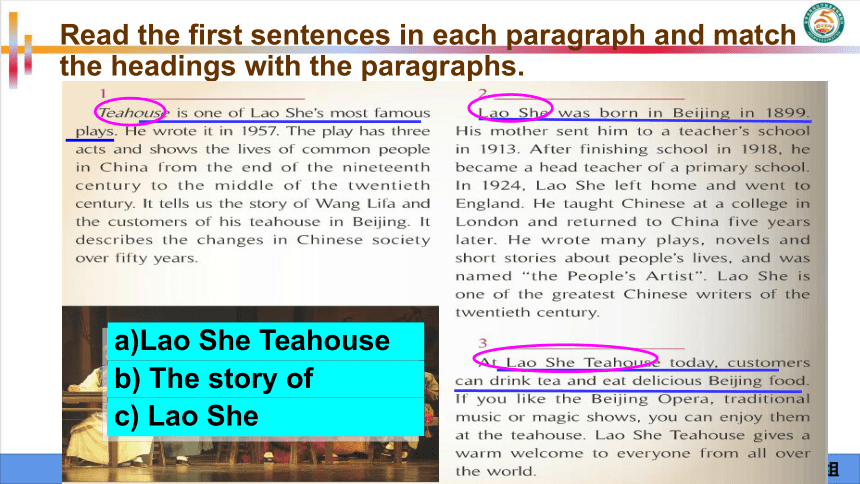

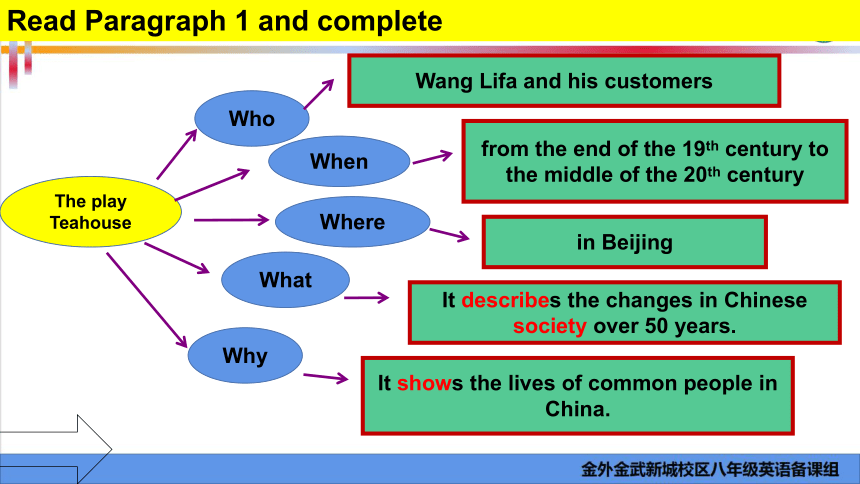
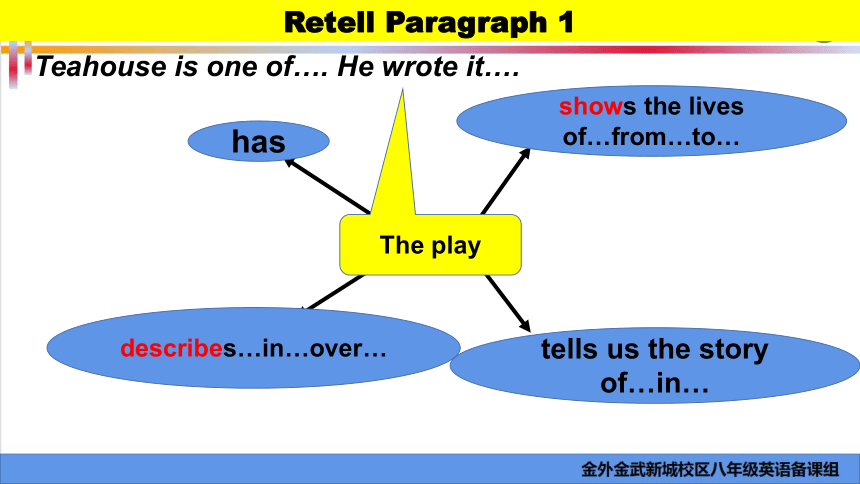
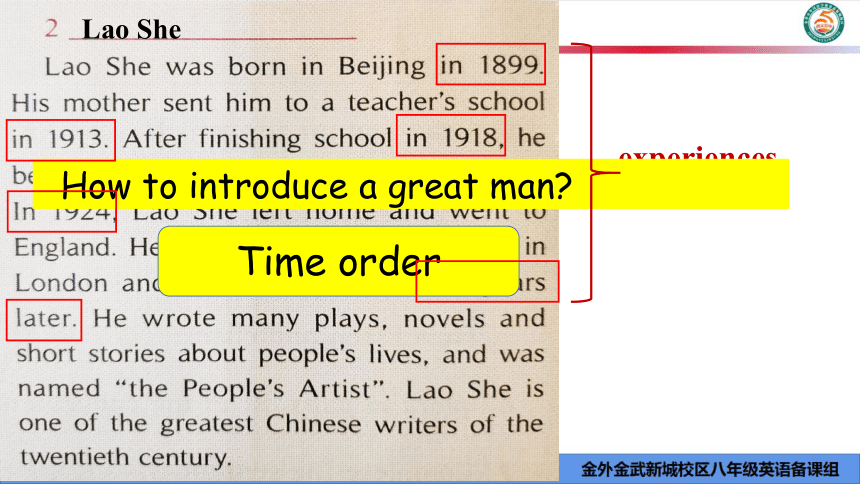
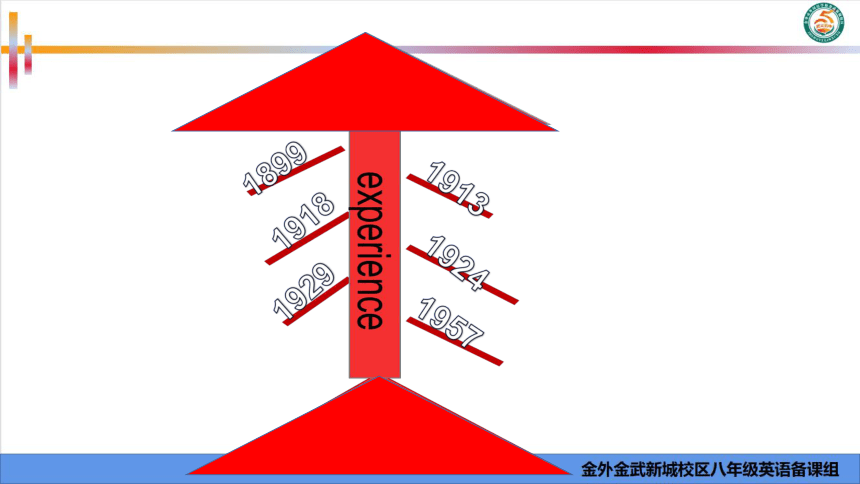
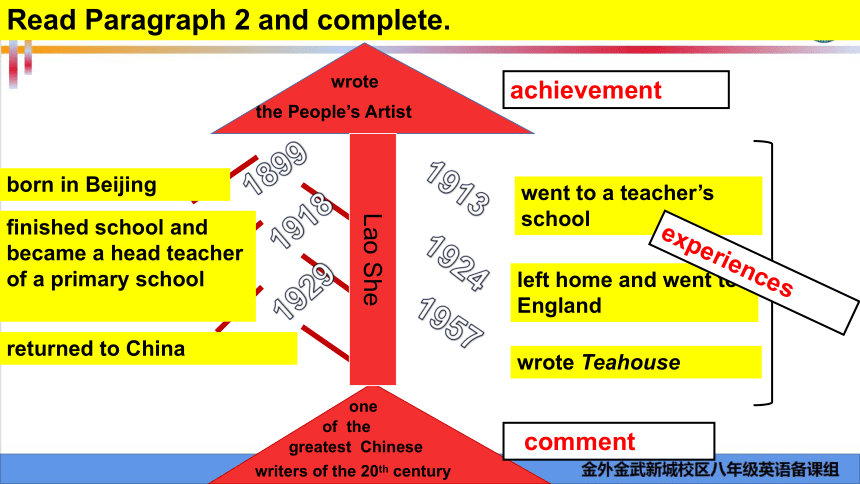
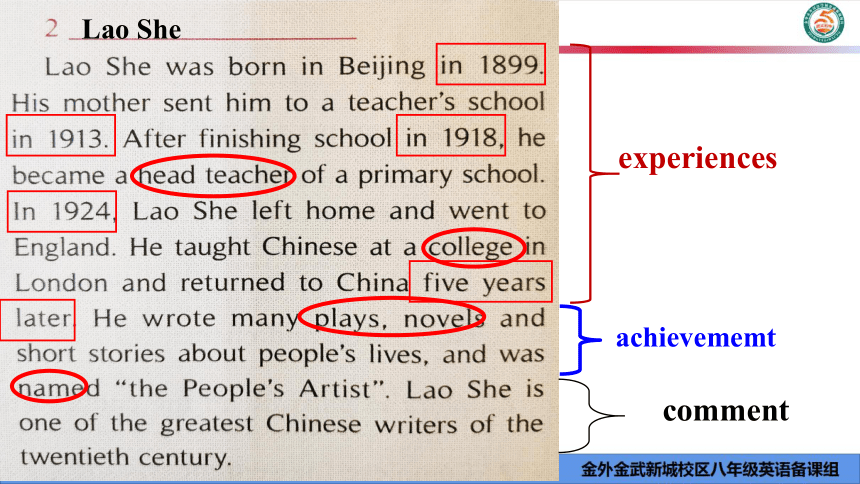
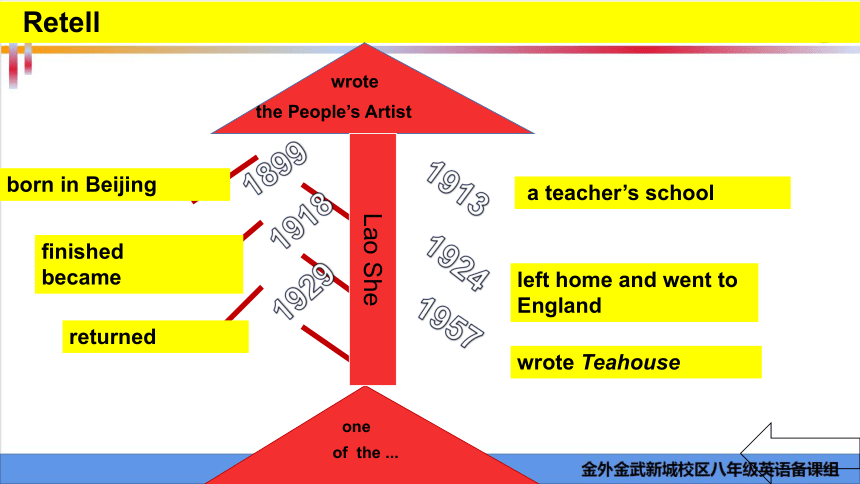
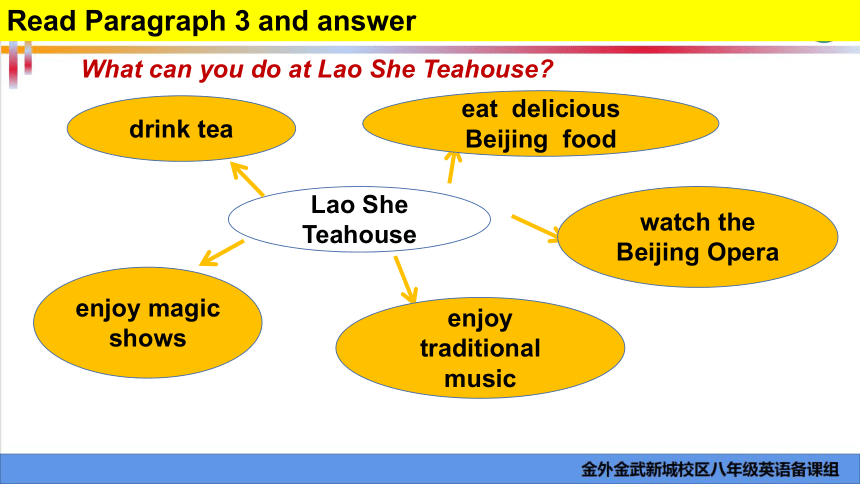
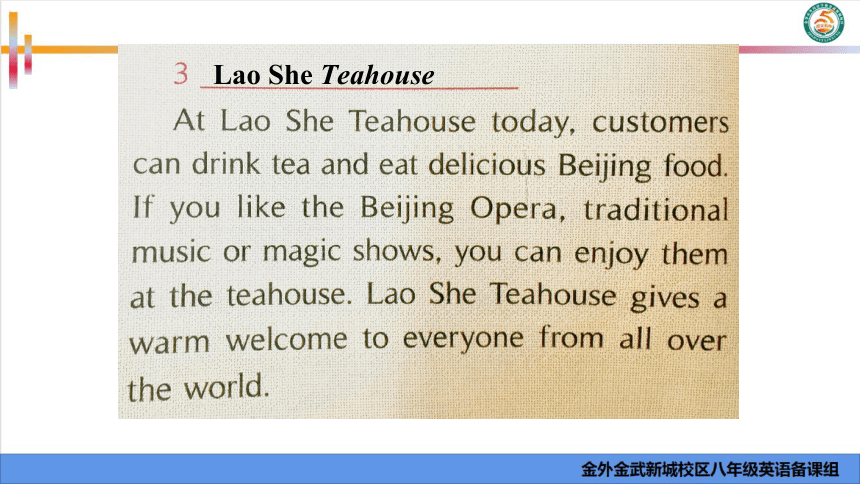
文档简介
(共30张PPT)
Module 5
Lao She Teahouse
Unit 2
It describes the changes in Chinese society.
Read the first sentences in each paragraph and match the headings with the paragraphs.
Lao She Teahouse
b) The story of Teahouse
c) Lao She
The story of Teahouse
who
when
where
what
why
The story
Read Paragraph 1 and complete
The play Teahouse
Who
When
Where
What
Why
Wang Lifa and his customers
from the end of the 19th century to the middle of the 20th century
in Beijing
It describes the changes in Chinese society over 50 years.
It shows the lives of common people in China.
Retell Paragraph 1
has
shows the lives of…from…to…
tells us the story of…in…
describes…in…over…
Teahouse is one of…. He wrote it….
The play
Lao She
experiences
Time order
How to introduce a great man
1899
1913
1918
1924
1929
1957
Read Paragraph 2 and complete.
the People’s Artist
1899
1913
1918
1924
1929
1957
born in Beijing
went to a teacher’s school
finished school and became a head teacher of a primary school
left home and went to England
returned to China
wrote Teahouse
one
of the
greatest Chinese
writers of the 20th century
Lao She
wrote
experiences
achievement
comment
Lao She
experiences
achievememt
comment
Retell
the People’s Artist
1899
1913
1918
1924
1929
1957
born in Beijing
a teacher’s school
finished
became
left home and went to England
returned
wrote Teahouse
one
of the ...
Lao She
wrote
Read Paragraph 3 and answer
What can you do at Lao She Teahouse
Lao She Teahouse
drink tea
eat delicious Beijing food
watch the Beijing Opera
enjoy traditional music
enjoy magic shows
Lao She Teahouse
Retell
Lao She Teahouse
drink tea
eat delicious Beijing food
watch the Beijing Opera
enjoy traditional music
enjoy magic shows
What is the purpose of writing the passage
To attract people to go to Lao She Teahouse.
…
Further thinking
Talk about Lao She ,the play Teahouse and Lao She Teahouse.
Group work
Sum up
From content
Lao She Teahouse, Lao She, Teahouse and the key vocabulary about them
From reading ability
The time clue
From writing
My favourite film/play
who
what
why
The story
when
where
century的常用表达:
XX世纪 the XXth century
XX世纪初 at the beginnning of the -th century
XX世纪中叶 in the middle of the -th century
XX世纪末 at the end of the -th century
one of+the或其他限定词+形容词最高级+名词复数指在某一范围内“最……之一”,该结构做主语时,谓语动词要用单数形式。
①长江是世界上最长的河流之一。
The Changjiang River is one of the longest rivers in the world.
②他是我们班最优秀的学生之一。
He is one of the best students in our class.
was named 意为“被称为,被命名为”
name 在这里是动词,表示“命名”,还可表示“任命”。
eg:Lili was named as the captain of our studying team.
李丽被任命为我们学习小组的组长。
give (sb.) a/an + adj. + welcome 对(某人)表示……欢迎
eg:Beijing gives a warm welcome to people from all over the world.
北京热情地欢迎来自世界各地的人们。
if 引导条件状语从句
(1)若主句中有情态动词,从句用一般现在时
①如果你想通过考试,你必须努力学习。
If you want to pass the exam, you must study hard.
②如果他早早地到那里,他就可以快点看病。
If he gets there early,he can see the doctor quickly.
(2)当if引导的条件句用来询问或谈论十分可能的事情时,主句使用一般将来时,从句用一般现在时。(主将从现)
①如果你见到他,你能告诉他那件事吗?
If you see him, will you tell him about it
②如果明天不下雨,我们将去公园。
If it doesn't rain tomorrow, we will go to the park.
M5U2重点短语句子
1.19世纪末 2.把...送到...
3.毕业 4.回到...
5.被命名为 6.人民艺术家
7.传统音乐 8.热烈欢迎
9.全世界
10.他给我们讲述的是王利发和他的顾客在他的北京茶馆里的故事。
11.老舍是20世纪中国最伟大的作家之一。
the end of 19th century
sent...to...
finish school
return to...
be named
the People's Artist
traditional music
give a warm welcome
all over the world
It tells us the story of Wang Lifa and the customers of his teahouse in Beijing.
Lao She is one of the greatest Chinese writers of the twentieth century.
12.老舍茶馆热烈欢迎来自世界各地的人们。
Lao She Teahouse gives a warm welcome to everyone from all over the world.
M5U2短文笔记
1. ...from the end of the 19th century to the middle of the 20th century. 从19世纪末到20世纪中期。
century的常用表达:
XX世纪 the XXth century
XX世纪初 at the beginnning of the -th century
XX世纪中叶 in the middle of the -th century
XX世纪末 at the end of the -th century
2. ... was named “the People's Artist”. 被命名为“人民艺术家”。
was named 意为“被称为,被命名为”
name 在这里是动词,表示“命名”,还可表示“任命”。
eg:Lili was named as the captain of our studying team.
李丽被任命为我们学习小组的组长。
3. Lao She is one of the greatest Chinese writers of the twentieth century. 老舍是20世纪中国最伟大的作家之一。
one of+the或其他限定词+形容词最高级+名词复数指在某一范围内“最……之一”,该结构做主语时,谓语动词要用单数形式。
eg:The Changjiang River is one of the longest rivers in the world.
长江是世界上最长的河流之一。
He is one of the best students in our class.
他是我们班最优秀的学生之一。
4.Lao She Teahouse gives a warm welcome to everyone from all over the world. 老舍茶馆热烈欢迎来自世界各地的人们。
give (sb.) a/an + adj. + welcome 对(某人)表示……欢迎
eg:Beijing gives a warm welcome to people from all over the world. 北京热情地欢迎来自世界各地的人们。
5.If you like the Beijing Opera, traditional music or magic shows, you can enjoy them at the teahouse. 如果你喜欢京剧、传统音乐或魔术表演,你可以在茶馆观赏这些节目。
if 引导条件状语从句
(1)若主句中有情态动词,从句用一般现在时
eg:If you want to pass the exam, you must study hard.
如果你想通过考试,你必须努力学习。
If he gets there early,he can see the doctor quickly.
如果他早早地到那里,他就可以快点看病。
(2)当if引导的条件句用来询问或谈论十分可能的事情时,主句使用一般将来时,从句用一般现在时。(主将从现)
eg:If you see him, will you tell him about it
如果你见到他,你能告诉他那件事吗?
If it doesn't rain tomorrow, we will go to the park.
如果明天不下雨,我们将去公园。
Module 5
Lao She Teahouse
Unit 2
It describes the changes in Chinese society.
Read the first sentences in each paragraph and match the headings with the paragraphs.
Lao She Teahouse
b) The story of Teahouse
c) Lao She
The story of Teahouse
who
when
where
what
why
The story
Read Paragraph 1 and complete
The play Teahouse
Who
When
Where
What
Why
Wang Lifa and his customers
from the end of the 19th century to the middle of the 20th century
in Beijing
It describes the changes in Chinese society over 50 years.
It shows the lives of common people in China.
Retell Paragraph 1
has
shows the lives of…from…to…
tells us the story of…in…
describes…in…over…
Teahouse is one of…. He wrote it….
The play
Lao She
experiences
Time order
How to introduce a great man
1899
1913
1918
1924
1929
1957
Read Paragraph 2 and complete.
the People’s Artist
1899
1913
1918
1924
1929
1957
born in Beijing
went to a teacher’s school
finished school and became a head teacher of a primary school
left home and went to England
returned to China
wrote Teahouse
one
of the
greatest Chinese
writers of the 20th century
Lao She
wrote
experiences
achievement
comment
Lao She
experiences
achievememt
comment
Retell
the People’s Artist
1899
1913
1918
1924
1929
1957
born in Beijing
a teacher’s school
finished
became
left home and went to England
returned
wrote Teahouse
one
of the ...
Lao She
wrote
Read Paragraph 3 and answer
What can you do at Lao She Teahouse
Lao She Teahouse
drink tea
eat delicious Beijing food
watch the Beijing Opera
enjoy traditional music
enjoy magic shows
Lao She Teahouse
Retell
Lao She Teahouse
drink tea
eat delicious Beijing food
watch the Beijing Opera
enjoy traditional music
enjoy magic shows
What is the purpose of writing the passage
To attract people to go to Lao She Teahouse.
…
Further thinking
Talk about Lao She ,the play Teahouse and Lao She Teahouse.
Group work
Sum up
From content
Lao She Teahouse, Lao She, Teahouse and the key vocabulary about them
From reading ability
The time clue
From writing
My favourite film/play
who
what
why
The story
when
where
century的常用表达:
XX世纪 the XXth century
XX世纪初 at the beginnning of the -th century
XX世纪中叶 in the middle of the -th century
XX世纪末 at the end of the -th century
one of+the或其他限定词+形容词最高级+名词复数指在某一范围内“最……之一”,该结构做主语时,谓语动词要用单数形式。
①长江是世界上最长的河流之一。
The Changjiang River is one of the longest rivers in the world.
②他是我们班最优秀的学生之一。
He is one of the best students in our class.
was named 意为“被称为,被命名为”
name 在这里是动词,表示“命名”,还可表示“任命”。
eg:Lili was named as the captain of our studying team.
李丽被任命为我们学习小组的组长。
give (sb.) a/an + adj. + welcome 对(某人)表示……欢迎
eg:Beijing gives a warm welcome to people from all over the world.
北京热情地欢迎来自世界各地的人们。
if 引导条件状语从句
(1)若主句中有情态动词,从句用一般现在时
①如果你想通过考试,你必须努力学习。
If you want to pass the exam, you must study hard.
②如果他早早地到那里,他就可以快点看病。
If he gets there early,he can see the doctor quickly.
(2)当if引导的条件句用来询问或谈论十分可能的事情时,主句使用一般将来时,从句用一般现在时。(主将从现)
①如果你见到他,你能告诉他那件事吗?
If you see him, will you tell him about it
②如果明天不下雨,我们将去公园。
If it doesn't rain tomorrow, we will go to the park.
M5U2重点短语句子
1.19世纪末 2.把...送到...
3.毕业 4.回到...
5.被命名为 6.人民艺术家
7.传统音乐 8.热烈欢迎
9.全世界
10.他给我们讲述的是王利发和他的顾客在他的北京茶馆里的故事。
11.老舍是20世纪中国最伟大的作家之一。
the end of 19th century
sent...to...
finish school
return to...
be named
the People's Artist
traditional music
give a warm welcome
all over the world
It tells us the story of Wang Lifa and the customers of his teahouse in Beijing.
Lao She is one of the greatest Chinese writers of the twentieth century.
12.老舍茶馆热烈欢迎来自世界各地的人们。
Lao She Teahouse gives a warm welcome to everyone from all over the world.
M5U2短文笔记
1. ...from the end of the 19th century to the middle of the 20th century. 从19世纪末到20世纪中期。
century的常用表达:
XX世纪 the XXth century
XX世纪初 at the beginnning of the -th century
XX世纪中叶 in the middle of the -th century
XX世纪末 at the end of the -th century
2. ... was named “the People's Artist”. 被命名为“人民艺术家”。
was named 意为“被称为,被命名为”
name 在这里是动词,表示“命名”,还可表示“任命”。
eg:Lili was named as the captain of our studying team.
李丽被任命为我们学习小组的组长。
3. Lao She is one of the greatest Chinese writers of the twentieth century. 老舍是20世纪中国最伟大的作家之一。
one of+the或其他限定词+形容词最高级+名词复数指在某一范围内“最……之一”,该结构做主语时,谓语动词要用单数形式。
eg:The Changjiang River is one of the longest rivers in the world.
长江是世界上最长的河流之一。
He is one of the best students in our class.
他是我们班最优秀的学生之一。
4.Lao She Teahouse gives a warm welcome to everyone from all over the world. 老舍茶馆热烈欢迎来自世界各地的人们。
give (sb.) a/an + adj. + welcome 对(某人)表示……欢迎
eg:Beijing gives a warm welcome to people from all over the world. 北京热情地欢迎来自世界各地的人们。
5.If you like the Beijing Opera, traditional music or magic shows, you can enjoy them at the teahouse. 如果你喜欢京剧、传统音乐或魔术表演,你可以在茶馆观赏这些节目。
if 引导条件状语从句
(1)若主句中有情态动词,从句用一般现在时
eg:If you want to pass the exam, you must study hard.
如果你想通过考试,你必须努力学习。
If he gets there early,he can see the doctor quickly.
如果他早早地到那里,他就可以快点看病。
(2)当if引导的条件句用来询问或谈论十分可能的事情时,主句使用一般将来时,从句用一般现在时。(主将从现)
eg:If you see him, will you tell him about it
如果你见到他,你能告诉他那件事吗?
If it doesn't rain tomorrow, we will go to the park.
如果明天不下雨,我们将去公园。
同课章节目录
- Module 1 How to learn English
- Unit 1 Let's try to speak English as much as possi
- Unit 2 You should smile at her.
- Unit 3 Language in use .
- Module 2 My home town and my country
- Unit 1 It's taller than many other buildings.
- Unit 2 Cambridge is a beautiful city in the east o
- Unit 3 Language in use .
- Module 3 Sports.
- Unit 1 Nothing is more exciting than playing tenni
- Unit 2 This year we training more carefully.
- Unit 3 Language in use .
- Module 4 Planes, ships and trains .
- Unit 1 He lives the farthest from school.
- Unit 2 What is the best way to travel.
- Unit 3 Language in use .
- Module 5 Lao She Teahouse.
- Unit 1 I wanted to see the Beijing Opera.
- Unit 2 It descibes the changes in Chinese society.
- Unit 3 Language in use .
- Module 6 Animals in danger.
- Unit 1 It allows people to get closer to them .
- Unit 2 The WWF is working hard to save them all.
- Unit 3 Language in use .
- Revision module A
- Module 7 A famous story
- Unit 1 Alice was sitting with her sister by the ri
- Unit 2 She was thinking about her cat.
- Unit 3 Language in use .
- Module 8 Accidents
- Unit 1 While the car were changing to red, a car s
- Unit 2 I was trying to pick it up when it bite me
- Unit 3 Language in use .
- Module 9 Population
- Unit 1 The population of China is about 1.37 billi
- Unit 2 Arnwick was a city with 200,000 people.
- Unit 3 Language in use .
- Module 10 The weathe
- Unit 1 It might snow.
- Unit 2 The weather is fine all year round.
- Unit 3 Language in use .
- Module 11 Way of life
- Unit 1 In China ,we open a gift later.
- Unit 2 In England, you usually drink tea with milk
- Unit 3 Language in use .
- Module 12 Help
- Unit 1 What should we do before help arrives?
- Unit 2 Stay away from windows and heavy furniture.
- Unit 3 Language in use .
- Revision module B
